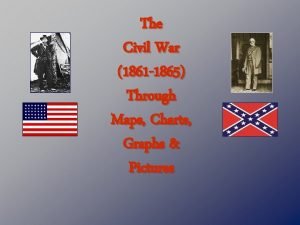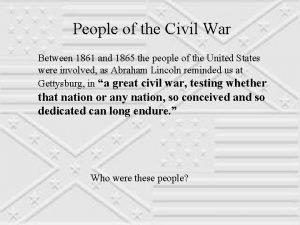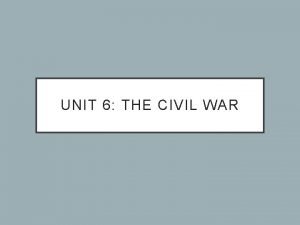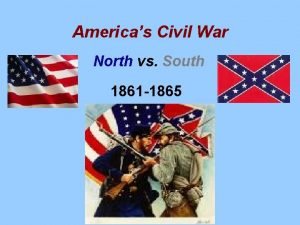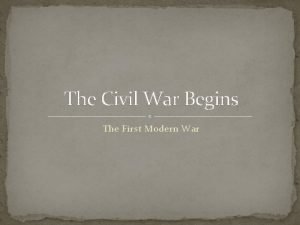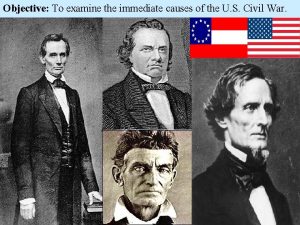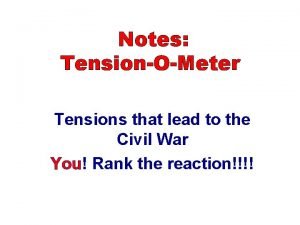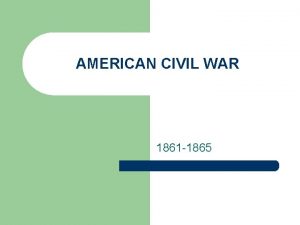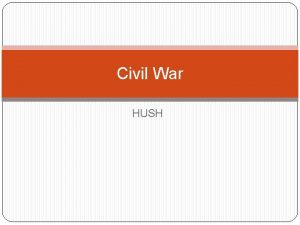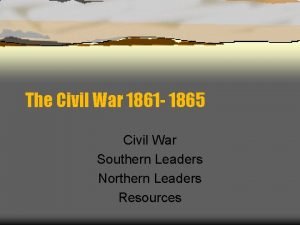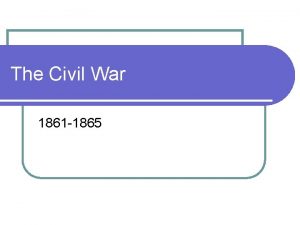The U S Civil War 1861 1865 North










- Slides: 10

The U. S. Civil War: 1861 -1865 North versus South

Battle of Fort Sumter: April 1861 The Civil War Begins! � � � The election of Abraham Lincoln as president in 1860 led to the secession crisis and the formation of the Confederate States of America. Lincoln’s policy was to oppose secession but to take no military action until the South started fighting. He did not believe the South had the right to secede from the Union and viewed the action as rebellion against the U. S. government. The South believed it had the right to secede because its states’ rights were not protected. In April 1861, the South seized Fort Sumter in Charleston, SC. Lincoln called for troops to put down the rebellion. Four more southern states, including Virginia, seceded.

The U. S. Civil War: 1861 -1865 United States of America v. Confederate States of America � President: � Abraham � President: Lincoln � Jefferson Davis � Capital: � Washington, � Richmond, DC � “The Yanks” (Blue) VA � “The Rebels” (Gray)

Union (North) Resources, Strengths, & Strategy Resources/Strengths: � More factories & industry � More people (manpower) � Strong Railroad network � Strong navy � Famous Generals: � Ulysses S. Grant � Winfield Scott � William T. Sherman � Strategy to Win: � The Anaconda Plan � Blockade of Southern ports to prevent South from importing food and military supplies. � Destroy all Southern resources used to wage war (“March to the Sea”) � Seize control of Mississippi River and occupy southern capital, Richmond. �

Confederacy (South) Resources, Strength, & Strategy Resources/Strengths: � Geography: “home-field” advantage � Better generals (West Point graduates) � Cotton � Better riders & marksman � Famous Generals: � Robert E. Lee � Stonewall Jackson � P. G. T. Beauregard � � Strategy to Win: � Attack Union repeatedly � Inflict heavy casualties � Wear down the Union until it lost the will to fight � Gain diplomatic recognition & financial assistance from Europe (France & Great Britain).

Union (North) Resources, Strength, & Strategy Resources/Strengths: � More industry and resources � More people (manpower) � Strong alliance network � Strong cities Famous Generals: � Ulysses S. Grant, � Winfield Scott, � William Tecumseh Sherman Strategy to Win: � The Anaconda Plan � Stop of Southern railroad to prevent South from importing food and military supplies. � Divide all Southern used to wage war (“March to the Sea”) � Seize land East of Mississippi River and Capture the southern capital, Richmond Virginia.




Station 2: Color the Union States, Border States, and Confederate States.
